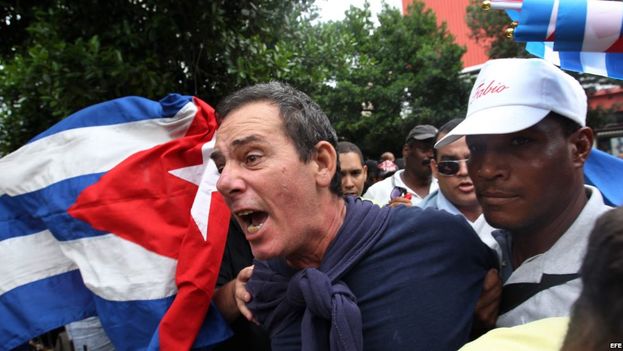
![]() 14ymedio, Havana, 22 September 2016 — A report from the European Union details that in 2015 Cuba continued “arbitrary and short-term arrests of opposition members, activists and human rights defenders.” This situation that has led the bloc to communicate “on several occasions” its concern to the authorities of the island.
14ymedio, Havana, 22 September 2016 — A report from the European Union details that in 2015 Cuba continued “arbitrary and short-term arrests of opposition members, activists and human rights defenders.” This situation that has led the bloc to communicate “on several occasions” its concern to the authorities of the island.
The document, released Tuesday, collects details of the situation faced by human rights and democracy activists around the world. In the chapter dedicated to Cuba, the EU reports that last year it urged the Cuban government to ratify “the United Nations Covenants on Civil and Political Rights and on Economic, Social and Cultural Rights.”
In particular, it underscores the EU’s concern about “discrimination and violence against women, freedom of expression and association” and calls on the Cuban government to give “more space to the activities of civil society” and to respect “freedom of movement” inside and outside the country.
EU member states have participated in “monitoring and have reported on the use of short-term detentions and violations of freedoms of association and assembly,” says the text.
The document refers to the first EU-Cuba talks on human rights that took place in Brussels on 25 June 2015, in which representatives of the island pledged “to conduct future talks with the EU based on universally recognized human rights.”
The EU and Cuba held negotiations for a Political Dialogue and Cooperation Agreement. On Thursday the European Commission has proposed to the countries of the European Union to support the Agreement and has requested that the EU’s Common Position on Cuba – which “encourages a process of transition to a pluralist democracy and respect for human rights and fundamental freedoms” – in force since 1996, be repealed.
The report explains that the EU representatives in Havana have continued to interact with “various representatives of Cuban civil society” and those contacts have contributed to the analysis and monitoring of the situation of “freedom of expression and association, freedom of belief and labor rights.”
However, the text acknowledges that “holding open meetings with leading government critics remained impossible, particularly for ministers and senior officials from the EU and the Member States on an official visit.”
The EU has maintained close contact with former prisoners of the 2003 Black Spring still residing on the island and has spoken with the Cuban authorities on the right of the activists to leave the country. Currently these former political prisoners are allowed to make only one trip out of the country.
The work of the European Union in Cuba also focuses on “strengthening the capacity of women entrepreneurs, preventing violence against women, [and] strengthening the capacity of organizations representing people with disabilities.”
Topics such as “sex education, support for private initiative and the entrepreneurial spirit in urban development, agriculture and energy” are also on bloc’s agenda with Cuba.
“The EU is undertaking an ongoing effort to expand the participation of independent civil society organizations in its political and cooperative work,” the report concludes.
